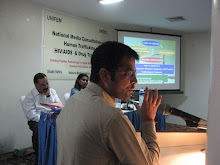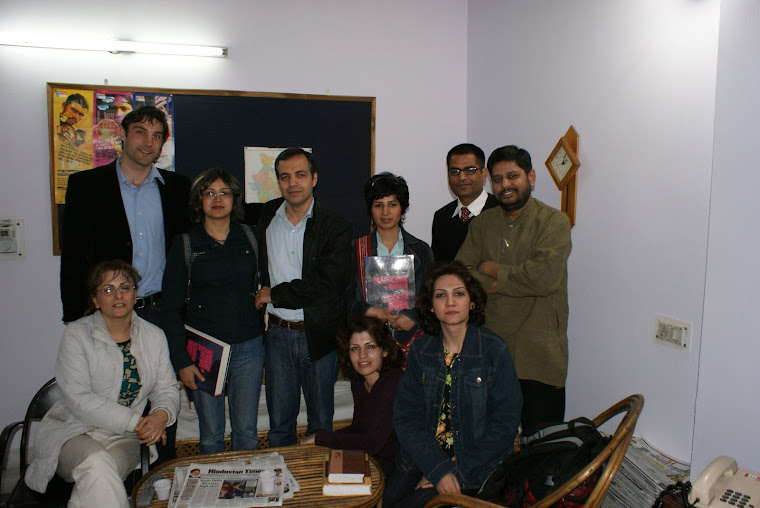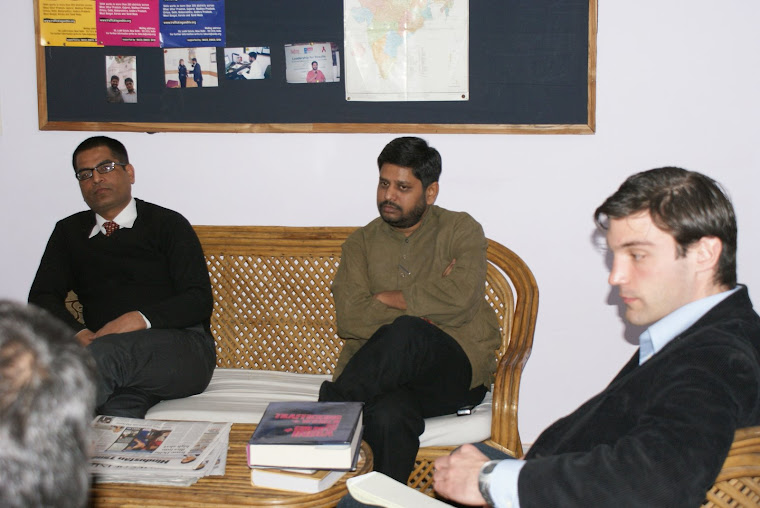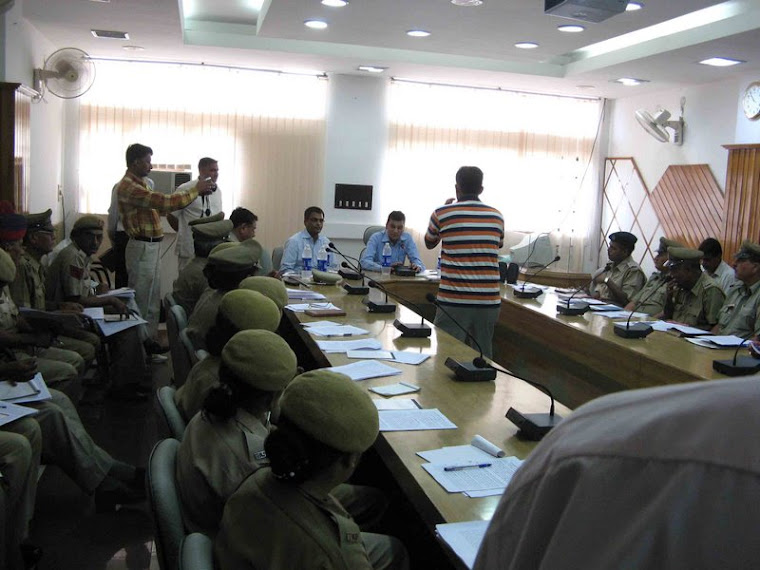SC panel inspects Maya's pet park project in Noida
9 Comments Post Comment
ANI Tags : Supreme Court, Mayawati, Noida park project Posted: Thursday , Aug 06, 2009 at 1517 hrs Noida:
Most Read Articles
Cong talks of poor but works for rich, says MulayamMayawati demands Rs 27
The Supreme Court panel on Thursday inspected Uttar Pradesh Chief Minister Mayawati's Noida park project.
A high-level committee constituted by the apex court visited the Ambedkar Park to look into the alleged violation of environmental laws in the construction of a park in NOIDA.
Uttar Pradesh Chief Secretary was also present.
In July, the Ministry of Environment and Forest sought an explanation from Uttar Pradesh Government over alleged violation of environmental laws in the construction of a park.
Uttar Pradesh Government is constructing Memorial Park in 33-hectare area along the Yamuna riverbed in Sector 15 -A of NOIDA.
The State Government is installing statues of Mayawati, her political mentor Kanshi Ram, and Dr B. R. Ambedkar in this park. This park is a new addition to the controversial statue installation projects taken up by the Mayawati''s Government.
Ads by Google
Residents and environmentalists are opposing to the statue installations as it violated the green law.
Earlier, the team of Indian Forest Service officers sent by the Central Government to probe the alleged violations found out that around 6,000 trees have been chopped down for the project. Their report also pointed that the State Government ignored an environment impact assessment required for such a projects.
Earlier, a two-Judge Bench of the apex court had refused to intervene in the statue installation projects of the Uttar Pradesh Government.
Friday, August 7, 2009
08/07/2009 10:21INDIA
For India’s Supreme Court kicking one’s wife is not an act of "cruelty"
by Nirmala Carvalho
According to the ruling the husband and family should not be prosecuted for abuse. An Indian deputy calls for the intervention of the Ministry of Justice. Activist condemn the decision as "an insult to all humanity" and point the finger at the "patriarchal"society that legitimizes violence.
New Delhi (AsiaNews) - India’s women are in revolt against a recent Supreme Court decision, which states that "kicking one’s daughter-in-law is not an act of cruelty." Women have branded the ruling as "retrograde" and are demanding the intervention of the Ministry for Justice.
The dispute stems from a family case between a woman and her husband, who lives in South Africa. The highest judicial body in India has ruled that the man and his relatives can not be prosecuted for "cruelty" towards his wife, just because the mother-in-law or other family members of the group beaten and kicked her and threatened her with divorce.
A branch of the Supreme Court, chaired by the Chief Judge SB Sinha explains that other charges can be laid, but not to Section 498A of the Indian Penal Code, which punishes the husband’s - or his relatives - maltreatment of the woman. Brinda Karat, a key figure in the Marxist-inspired Communist Party of India, sent a letter to Minister for Justice Veerappa Moily, requesting a review of the trial because it is the roadmap "to legalize domestic violence”.
Julia George, a lawyer and activist from Stree Vani - "Voice of Women", an association based in Pune, in Maharashtra - describes the story as "not only an insult to women, but to all humanity”. “Even the act itself of kicking is inhumane - she explains to AsiaNews -It is distressing that, even today, there are honourable members of the judiciary that take this position”.
The lawyer stressed that the question arises within families, where women are "beaten to death not only by husbands, but also by his relatives”. “The question – states Julia - exceeds the boundaries of social class, education or wealth”. It is due to the "patriarchal" logic typical of Indian society, which "encourages women to accept gender oppression."
The activist, reports that during her professional career in Maharashtra she has witnessed many cases of domestic, physical and mental violence. For this reason it is essential to strengthen "education" but it "must not be one sided only, men too must be educated and sensitized." "Women - Julia George concludes - face tremendous obstacles and difficulties even to denounce cases of abuse. The same police officers are reluctant to receive complaints. Laws are the cornerstone of the Indian Constitution and what we do is invite women to take a step forward and to help them do so".
For India’s Supreme Court kicking one’s wife is not an act of "cruelty"
by Nirmala Carvalho
According to the ruling the husband and family should not be prosecuted for abuse. An Indian deputy calls for the intervention of the Ministry of Justice. Activist condemn the decision as "an insult to all humanity" and point the finger at the "patriarchal"society that legitimizes violence.
New Delhi (AsiaNews) - India’s women are in revolt against a recent Supreme Court decision, which states that "kicking one’s daughter-in-law is not an act of cruelty." Women have branded the ruling as "retrograde" and are demanding the intervention of the Ministry for Justice.
The dispute stems from a family case between a woman and her husband, who lives in South Africa. The highest judicial body in India has ruled that the man and his relatives can not be prosecuted for "cruelty" towards his wife, just because the mother-in-law or other family members of the group beaten and kicked her and threatened her with divorce.
A branch of the Supreme Court, chaired by the Chief Judge SB Sinha explains that other charges can be laid, but not to Section 498A of the Indian Penal Code, which punishes the husband’s - or his relatives - maltreatment of the woman. Brinda Karat, a key figure in the Marxist-inspired Communist Party of India, sent a letter to Minister for Justice Veerappa Moily, requesting a review of the trial because it is the roadmap "to legalize domestic violence”.
Julia George, a lawyer and activist from Stree Vani - "Voice of Women", an association based in Pune, in Maharashtra - describes the story as "not only an insult to women, but to all humanity”. “Even the act itself of kicking is inhumane - she explains to AsiaNews -It is distressing that, even today, there are honourable members of the judiciary that take this position”.
The lawyer stressed that the question arises within families, where women are "beaten to death not only by husbands, but also by his relatives”. “The question – states Julia - exceeds the boundaries of social class, education or wealth”. It is due to the "patriarchal" logic typical of Indian society, which "encourages women to accept gender oppression."
The activist, reports that during her professional career in Maharashtra she has witnessed many cases of domestic, physical and mental violence. For this reason it is essential to strengthen "education" but it "must not be one sided only, men too must be educated and sensitized." "Women - Julia George concludes - face tremendous obstacles and difficulties even to denounce cases of abuse. The same police officers are reluctant to receive complaints. Laws are the cornerstone of the Indian Constitution and what we do is invite women to take a step forward and to help them do so".
Judicial system must meet people’s expectations, says President
Legal Correspondent
President Prathiba Patil receiving the book, “The Judge Speaks,” from Justice A.R. Lakshmanan, Chairman of the Law Commission of India, at Rashtrapat Bhavan in New Delhi.
New Delhi: The judiciary “is one of the basic pillars of the Constitution and has played a crucial role in the development and evolution of our democracy,” said President Prathiba Patil.
This was her message on the book, “The Judge Speaks,” by Law Commission Chairman Justice A.R. Lakshmanan.
“As Justice Lakshmanan has commented, the confidence of the people in the legal system and in the justice delivery system is an essential pre-requisite for the very survival of democracy. Our judicial system must function in a manner that meets these expectations of the nation and its people,” the President said. She received a copy of the book at a function held at the Rashtrapati Bhavan on Tuesday.
The speeches Justice Lakshmanan delivered during his tenure as Supreme Court judge and subsequently as Law Commission Chairman are published in the book. Salient features
Justice Lakshmanan, who was accompanied by his wife and members of the Commission, briefed the President on the book and apprised her of three other books (two in English and one in Tamil — ‘Varalatru Suvadugal’) he authored. He also briefed Ms. Patil on the salient features of the Commission’s reports on various issues relating to the justice delivery system.
In his message, Chief Justice of India K.G. Balakrishnan said: “The contents of the speeches range from philosophical insights into constitutionalism, justice and the rule of law to concrete suggestions pertaining to contemporary areas of legislation and adjudication such as intellectual property, regulation of cyberspace, economic offence, tax and property laws.”Crucial role
Justice Lakshmanan said: “The judiciary has played a crucial role in the development and evolution of society in general and in ensuring good governance by those holding the reins of power in particular. Perhaps, there can be no two views about the significance of the role expected of the judiciary, vis-À-vis, the goal and good governance in a free , society.”
The Hindu 7th Aug 2009
Legal Correspondent
President Prathiba Patil receiving the book, “The Judge Speaks,” from Justice A.R. Lakshmanan, Chairman of the Law Commission of India, at Rashtrapat Bhavan in New Delhi.
New Delhi: The judiciary “is one of the basic pillars of the Constitution and has played a crucial role in the development and evolution of our democracy,” said President Prathiba Patil.
This was her message on the book, “The Judge Speaks,” by Law Commission Chairman Justice A.R. Lakshmanan.
“As Justice Lakshmanan has commented, the confidence of the people in the legal system and in the justice delivery system is an essential pre-requisite for the very survival of democracy. Our judicial system must function in a manner that meets these expectations of the nation and its people,” the President said. She received a copy of the book at a function held at the Rashtrapati Bhavan on Tuesday.
The speeches Justice Lakshmanan delivered during his tenure as Supreme Court judge and subsequently as Law Commission Chairman are published in the book. Salient features
Justice Lakshmanan, who was accompanied by his wife and members of the Commission, briefed the President on the book and apprised her of three other books (two in English and one in Tamil — ‘Varalatru Suvadugal’) he authored. He also briefed Ms. Patil on the salient features of the Commission’s reports on various issues relating to the justice delivery system.
In his message, Chief Justice of India K.G. Balakrishnan said: “The contents of the speeches range from philosophical insights into constitutionalism, justice and the rule of law to concrete suggestions pertaining to contemporary areas of legislation and adjudication such as intellectual property, regulation of cyberspace, economic offence, tax and property laws.”Crucial role
Justice Lakshmanan said: “The judiciary has played a crucial role in the development and evolution of society in general and in ensuring good governance by those holding the reins of power in particular. Perhaps, there can be no two views about the significance of the role expected of the judiciary, vis-À-vis, the goal and good governance in a free , society.”
The Hindu 7th Aug 2009
Supreme Court should holiday less, work more
Supreme Court should holiday less, work more
Nagendar Sharma, Hindustan Times
New Delhi, August 07, 2009
To deal with the piling backlog of cases, the Supreme Court and high court judges must cut down holidays and put in longer hours at work, said a body that advises the government on law and judicial reforms.
“Considering the staggering arrears, vacations in the higher judiciary must be curtailed by at least 10 to 15 days and the court working hours should be extended by at least half an hour,” the law commission has said.
The commission is appointed by the government to review and suggest changes in the legal system. A former Supreme Court judge heads it, but its recommendations are not binding.
The above suggestion comes in a report given to law minister Veerappa Moily on Wednesday. The government has not yet taken a view on it, and an official in the ministry said it was too early to respond.
The Supreme Court works only 190 days a year, by its own admission to the Parliamentary Standing Committee on Law and Justice. That’s just a little over six months. A long summer vacation, weekly offs and national holidays such as the Independence Day make up the rest.
And look at the pending cases: 50,000 in the Supreme Court and 37 lakh in the 21 high courts in the country. The apex court adds thousands to the backlog every year with its present pace of work.
“It is an outdated British legacy which should have been done away with six decades back,” said former Chief Justice of India JS Verma, adding he couldn’t think of any other country where judges have as many holidays
This is a hangover from the colonial days when the scalding heat of Delhi summer forced the judges – mostly British when the practice took root – to shut down the courts and escape to Shimla, the nearest hill station.
When independent India switched to its own legal system, it borrowed heavily from the colonial set up, including the vacations, which Verma said, should have been dropped.
They could perhaps reach down to the lower courts for inspiration – they have a much shorter summer vacation , only 24 days compared to 50 days for SC and 30 for HCs
Nagendar Sharma, Hindustan Times
New Delhi, August 07, 2009
To deal with the piling backlog of cases, the Supreme Court and high court judges must cut down holidays and put in longer hours at work, said a body that advises the government on law and judicial reforms.
“Considering the staggering arrears, vacations in the higher judiciary must be curtailed by at least 10 to 15 days and the court working hours should be extended by at least half an hour,” the law commission has said.
The commission is appointed by the government to review and suggest changes in the legal system. A former Supreme Court judge heads it, but its recommendations are not binding.
The above suggestion comes in a report given to law minister Veerappa Moily on Wednesday. The government has not yet taken a view on it, and an official in the ministry said it was too early to respond.
The Supreme Court works only 190 days a year, by its own admission to the Parliamentary Standing Committee on Law and Justice. That’s just a little over six months. A long summer vacation, weekly offs and national holidays such as the Independence Day make up the rest.
And look at the pending cases: 50,000 in the Supreme Court and 37 lakh in the 21 high courts in the country. The apex court adds thousands to the backlog every year with its present pace of work.
“It is an outdated British legacy which should have been done away with six decades back,” said former Chief Justice of India JS Verma, adding he couldn’t think of any other country where judges have as many holidays
This is a hangover from the colonial days when the scalding heat of Delhi summer forced the judges – mostly British when the practice took root – to shut down the courts and escape to Shimla, the nearest hill station.
When independent India switched to its own legal system, it borrowed heavily from the colonial set up, including the vacations, which Verma said, should have been dropped.
They could perhaps reach down to the lower courts for inspiration – they have a much shorter summer vacation , only 24 days compared to 50 days for SC and 30 for HCs
Subscribe to:
Comments (Atom)













































